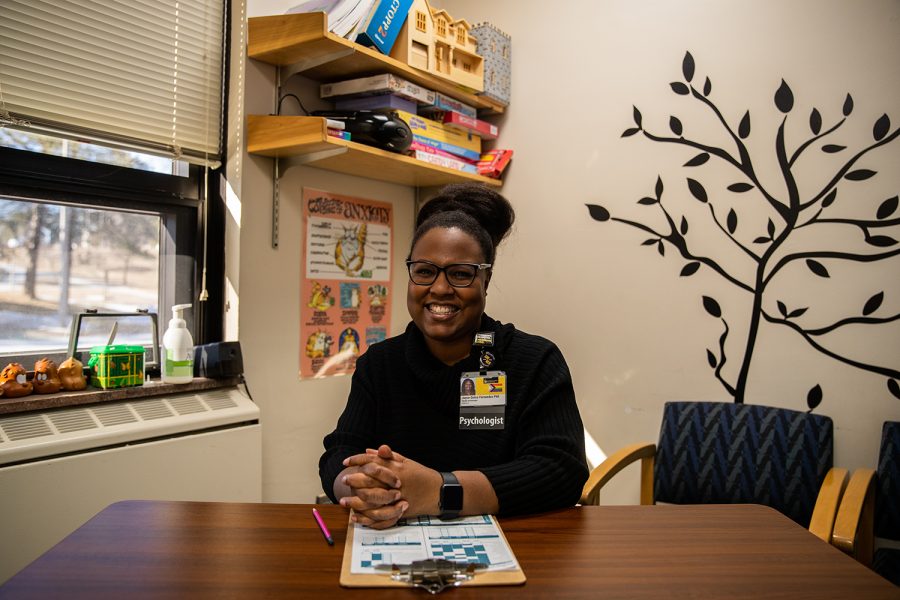UI Health Care Black Faculty Council looks to grow through recruitment, retention
The UI Health Care Black Faculty Council, which celebrated its first birthday in January, will look to grow beyond its current 10 members and continue to focus on recruiting and retaining faculty to create a more diverse workplace.
Vice Chair of Diversity, Equity, and Inclusion Joyce Goins-Fernandez poses for a portrait on Monday, Feb. 14, 2022, at the Center for Disabilities and Development building.
February 15, 2022
The Black Faculty Council at the University of Iowa Health Care is looking to recruit underrepresented populations and retain more Black medical students.
The council originally formed as a support group for Black UIHC faculty after the murder of George Floyd in May 2020, and evolved into a 10-member council in January 2021 with the goal to diversify departments within UI health care.
Black Faculty Council founder and president Joyce Goins-Fernandez said that as a psychologist, she wanted to know how other people of color were feeling at the time.
“I soon found out that many of the physicians, they seemed to want to do more than just sitting around and discuss how they were experiencing everything,” Goins-Fernandez said. “They wanted to be more action-oriented.”
Goins-Fernandez, also an assistant professor of pediatrics-developmental and behavioral pediatrics, said much of that action has manifested in public outreach, including working with clinics in the area to alleviate concerns about COVID-19 vaccines.
Councilor Keith Carter, professor of ophthalmology, visual sciences, and cosmetic surgery, said the council developed into both an internal tool to support Black faculty and students and an external tool to support community outreach.
Carter said the council’s existence is important because as a person of color, it is difficult to have a voice when there are so few minorities in the community.
“I think part of the reason we have issues in healthcare as far as caring for people of color is that there’s mistrust in the community,” Carter said. “There’s history where people of color have been used and mistreated within the healthcare system.”
Carter said mistrust can be specifically attributed to incidents like the treatment of Black men in the Tuskegee syphilis study.
In the study, the U.S. Public Health Service allowed 399 Black men infected with syphilis to go untreated to study the long-term effects of the disease.
RELATED: Carver College of Medicine Latinx Faculty Council works to improve representation
Carter said because of this mistrust, the council has focused on outreach through a partnership to deliver COVID-19 vaccines to Black populations through the UI Mobile Clinic .
“It’s hard to listen to the [health care] system tell you that it’s good for you when they feel, ‘You haven’t done anything good for us ever, why are we going to believe you here?’” he said.
Growth is a large focus for Goins-Fernandez, and she hopes to see an increase in Black faculty within UI health care so, as a result, the council can grow.
“Since 2020, I’ve had requests from parents who have children of color who want to see a therapist that looks like them,” Goins-Fernandez said. “Within UIHC, for those Black kids, I’m it. But obviously, I can’t see all of the Black kids in Iowa City.”
She said of the nearly 175 faculty members in her department, only four are Black.
Dionne Skeete, councilor and general surgeon at UIHC, said Black representation is hugely disproportionate within her department, as well.
“I can count on one hand the number of other African-American residents and faculty we’ve had throughout the years,” Skeete said. “I don’t necessarily get to interact a lot with other African-American faculty on a day-to-day basis. We’re all kind of in our silos, clinically.”
Skeete said the council has provided her with the connection to other Black faculty within medicine at the UI, as well as allowing council members to raise concerns within UIHC without fear of reprisal.
“I think going forward, our big opportunity [is] to provide a bigger influence in terms of mentorship to other faculty, fellows, residents, and students,” Skeete said. “That will go a long way towards recruitment and representation of underrepresented minorities here.”



